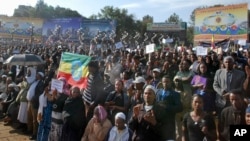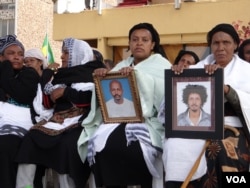Tens of thousands of Ethiopians gathered as emotions ran high at a mass rally in the capital, Addis Ababa, Wednesday commemorating 30 compatriots shot and beheaded by Islamic State militants in Libya.
Some demonstrators hurled stones and police fired teargas as protesters rallied in Meskel Square at dawn to denounce Islamic State. “We will not bow down to terrorism!” one placard carried by a young boy said. Another read: “The world must be united against terrorism.”
The demonstration marked the start of a three-day mourning period in the East African country.
Prime Minister Hailemariam Desalegn was among the officials and religious leaders who addressed the gathering.
The prime minister urged Ethiopians not to travel across the Sahara to reach Europe. “We should strengthen our resolve against any form of terrorism and extremism,” he added.
Although Ethiopia's economy is growing fast, unemployment remains high. Many opt to trek across the desert via Libya, where Islamic State militants have gained a toehold after seizing large parts of Syria and Iraq.
Ethiopia has confirmed that those killed in the video, posted Saturday, were its citizens. Family members and friends of the victims were given special attention during the event.
Aheza Kahesai, the mother of one the victims, said she found out her child was killed when someone else told her they had seen her son on television. Her 38-year old son left two months ago saying he had found a job as a driver overseas.
One man at the government-organized rally, who said he was a university professor, said many in the crowd were angry that jobless Ethiopians still felt they had to travel to places like Libya in the hope of crossing over to a better life in Europe.
He also accused the authorities of clamping down on free speech. “Even the chanting [at the rally] was led by the government,” he said. “We do not have the power to speak.”
The atmosphere changed when parts of the crowd began to voice the dissatisfaction of many toward the government's response not only to the Libya killings, but also to the lack of action to help Ethiopians caught up in the xenophobic attacks in South Africa.
Authorities then dispersed the crowds, with police using sticks and firing a few rounds of tear gas to clear out the main square. Dozens were taken into custody, and some wounded demonstrators and police were taken to the hospital. Less than two hours later everything was back to normal.
Ethiopia's government dismisses accusations from rights groups that it stifles critics and opponents.
But a 31-year-old student who requested anonymity had tears in his eyes as he viewed the scene Wednesday.
He said he understands people's frustration because the Ethiopian government doesn’t allow its citizens to express their feelings.
“The first thing the government should ask is why people are migrating. There are a lot of challenges here. I want to ask the government to search what is the problem of society to get out of their countries,” he said.
Ethiopia has a long history of Muslims and Christians living peacefully side-by-side, so the killings have stunned the many. Muslims make up about 40 percent of the population, according to government statistics, with followers of the Ethiopian Orthodox Church being the majority.
Muslim lawmakers in parliament on Tuesday read out verses in the Koran preaching tolerance.
“I am in pain. The innocent son of a poor mother butchered like he was,” said Ahaza Kasaye, the mother of one of those identified, said, propping herself up with a walking stick. “But I am heartened to see so many Ethiopians mourn him.”








